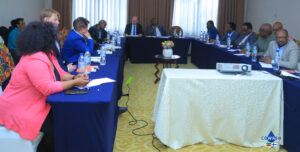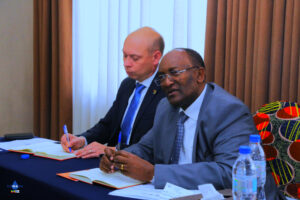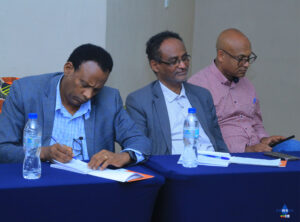The COWASH IV National Steering Committee successfully concluded its final meeting for Phase four yesterday, October 15, 2025, at the Capital Hotel. The committee reviewed the project’s significant progress, assessed key operational issues, and discussed the way forward.
 The committee meeting, which included representatives from the Ministry of Finance, Ministry of Water and Energy, Ministry of Education, Ministry of Health, and the Embassy of Finland, was co-chaired by Ambassador Asfaw Dingamo (PhD), State Minister of the Ministry of Water and Energy and Tomi Särkioja, Head of Cooperation at the Embassy of Finland.
The committee meeting, which included representatives from the Ministry of Finance, Ministry of Water and Energy, Ministry of Education, Ministry of Health, and the Embassy of Finland, was co-chaired by Ambassador Asfaw Dingamo (PhD), State Minister of the Ministry of Water and Energy and Tomi Särkioja, Head of Cooperation at the Embassy of Finland.
COWASH IV Chief Technical Advisor Neil Chadder presented project updates for the committee, including major works completed in the Ethiopian Fiscal Year 2017 (EFY 2017) and outlined plans for EFY 2018. Mr. Chadder also presented a general overview of the utilization of funding received from the Governments of Ethiopia and Finland. Following this, Assegid Teklu, COWASH IV Project Finance Coordinator at the Ministry of Finance, provided a detailed financial report specifically on the Government of Finland’s fund utilization in the project.
The committee held critical discussions on challenges, forward plans, and the official COWASH Phase V programme document, marking the final official review for Phase IV.
Key Achievements
 A major highlight of the meeting was the announcement that, with one year remaining, COWASH IV has already reached over 1 million beneficiaries (1,003,325) against its target of 1.1 million, as of the end of July. In EFY 2017 alone, the project delivered substantial infrastructure and capacity improvements, including the construction of 1,235 water points, directly benefiting 307,487 people. COWASH IV has also constructed water points in 160 schools and 112 health posts, improved latrines in 29 schools and 61 health posts and Menstrual Hygiene Management (MHM) centers in 31 schools. Furthermore, a critical focus on capacity building resulted in training provided to 14,068 individuals.
A major highlight of the meeting was the announcement that, with one year remaining, COWASH IV has already reached over 1 million beneficiaries (1,003,325) against its target of 1.1 million, as of the end of July. In EFY 2017 alone, the project delivered substantial infrastructure and capacity improvements, including the construction of 1,235 water points, directly benefiting 307,487 people. COWASH IV has also constructed water points in 160 schools and 112 health posts, improved latrines in 29 schools and 61 health posts and Menstrual Hygiene Management (MHM) centers in 31 schools. Furthermore, a critical focus on capacity building resulted in training provided to 14,068 individuals.
Since the beginning of Phase Four, the COWASH has also established 292 WASH saving and loan associations to foster financial independence for household latrine construction, and 26 market-based sanitation centers to provide accessible and affordable sanitation supplies to rural communities.
 To strengthen its impact, COWASH IV launched community conversation flipcharts and started training volunteer community members who will facilitate community conversations in EFY 2017 aiming to reinforce its Social and Behavioral Change efforts. The project continues to raise awareness and engage actively with school staff, WASH and gender clubs, and local communities to drive positive long-term change in hygiene practices.
To strengthen its impact, COWASH IV launched community conversation flipcharts and started training volunteer community members who will facilitate community conversations in EFY 2017 aiming to reinforce its Social and Behavioral Change efforts. The project continues to raise awareness and engage actively with school staff, WASH and gender clubs, and local communities to drive positive long-term change in hygiene practices.
Overall, the final COWASH IV Steering Committee meeting successfully highlighted the project’s achievement and concluded the meeting by agreeing to move forward with the presented plan and the points discussed.